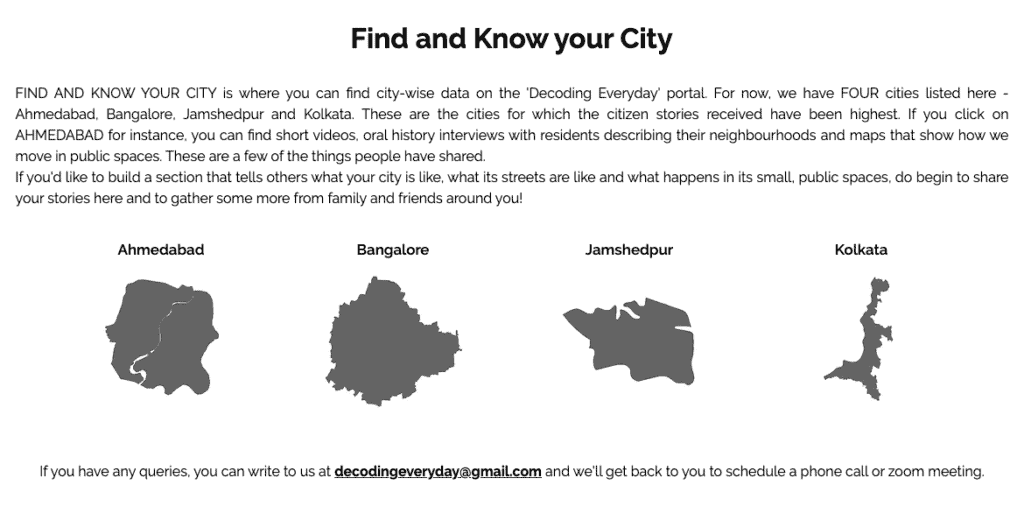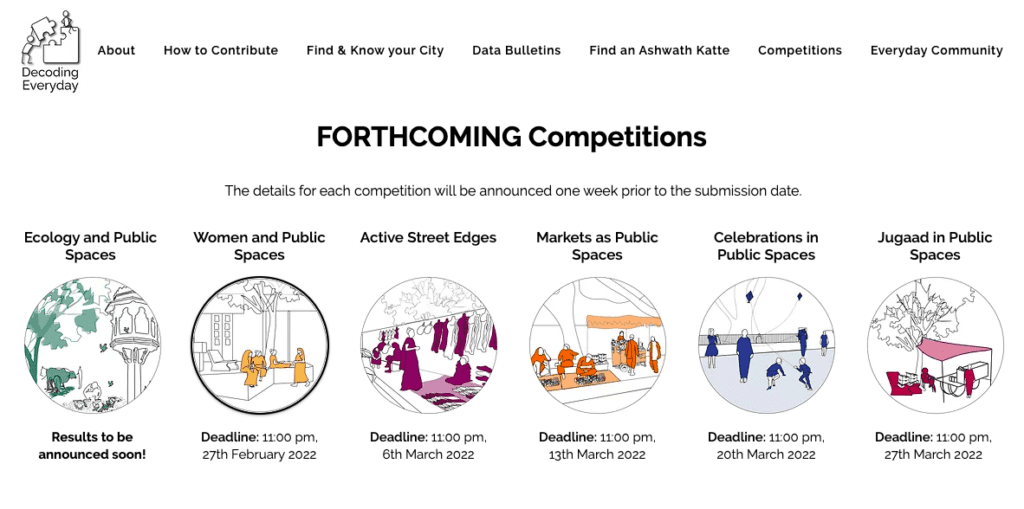‘Decoding Everyday’ is a citizen science portal which invites contributions from individual residents, student communities, RWA members and anyone interested to share their experiences and stories about streets and public spaces in cities. It is an initiative of the Bangalore-based Everyday City Lab (ECL) that was recently selected to be a part of the Citizen Innovation Lab’s (CIL) ‘Six-week Sprint’ within its Civic Tech program.
Under this program, CIL supports initiatives to develop technologies that enable citizens to engage with the government and/or communities to work towards civic participation in governance. The Everyday City Lab recently launched a series of six competitions which are meant to validate the need for such a platform.
The purpose of these competitions is also to understand whether citizens might be interested in contributing and if this data repository might be useful to government authorities and NGOs working with civic issues.
It may be possible for us to do collective sense-making, the process by which people give meaning to their collective experiences, through contributing stories about everyday and periodic activities and changes in their neighbourhoods in order to plan our cities better.

The online platform is designed to share stories that observe, record and reflect upon the social, cultural, religious and economic activities that take place on our streets in every neighbourhood.
It includes sections such as City Remembered that currently includes two oral history series – ‘Ask your Grandparents’ and ‘Women and Public Spaces’—which are interviews with people from these two distinct groups on how they use public space.
The Share What You Know section is about how each of us might perceive or experience public life in our cities. There is also a Discussion Forum for initiating a dialogue with others on a topic of your choice.
The Everyday Stories section of the portal shares one-minute videos uploaded by contributors on topics such as ‘A walk around the corner’, ‘Small, public spaces’ and so on.

Ecology and public spaces
Our streets comprise of many ecological elements such as vegetation, animals, birds and insects on which we as humans are dependent and and have a symbiotic relationship with. Our perceptions of these ecological elements might vary depending upon the context and hence the activities around them vary accordingly. The aim of this competition is to capture these different perceptions and contexts.
Read more : What Bengaluru’s peepul tree shrines can teach us about urban planning
Women and public spaces
This competition explores questions around how women perceive and use public spaces in their neighbourhoods. Which public spaces give them a sense of comfort and safety? Which spaces they are less likely to frequent? What are the priorities in terms of social, cultural and religious activities in their everyday lives?
Deadline: 11:00 pm, February 27th
Active street edges
While in most parts of the world, the street is a connector for people and vehicles to move, in India, the street is also a container that holds our everyday practices.
Typically, the central parts of streets become the mobility networks and the street edges become gathering places for informal conversations, to drink that cup of chai, to make a pani-puri stop, to pause at the newspaper stand or to pick up vegetables on one’s way home.
It is these Active Street Edges and the many, many stories within them that this competition hopes to bring together.
Deadline: 11:00 pm, March 6th
Read more : How street vendors survive in “silent” Sadashivanagar
Markets as public spaces
In this competition, we invite entries that observe, record and analyse the simple selling spaces in India that people frequent for their day-to-day needs. What is the nature of interdependencies between the different stakeholders in these markets? What are the patterns of movement, patterns of social behaviour, patterns of business relationships, of space-making, of communication and patterns of adaptation embedded here?
Deadline: 11:00 pm, March 13th
Celebrations in Public Spaces
Deadline: 11:00 pm, 20th March
Jugaad in Public Spaces
Deadline: 11:00 pm, 27th March
The first competition held in this series was on ‘Ecology and Public Spaces’ on Feb 20th, which received 20 entries. The themes and deadlines for the forthcoming three are given above. Each entry will receive a participation certificate and a few selected entries will be shared on the Decoding Everyday portal. The two best entries under each theme will receive a book gift voucher of Rs. 1500/-.
If you’d like to share your observations and reflections about your own neighbourhood, you could send in a reflective piece of writing, a photo essay, short videos, oral history interviews, maps or design sketches.
For more details, log on to: website Decoding Everyday
Instagram account @everydaycityindia